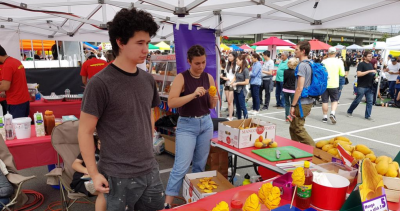You are here
Home 🌿 Regional 🌿 North America 🌿 Canada 🌿 Toronto joins Vancouver in recommending Canada decriminalization all drugs 🌿Toronto joins Vancouver in recommending Canada decriminalization all drugs

Toronto's top doctor has come out in favour of decriminalizing the personal possession of drugs, including hard drugs like cocaine and heroin.
She joins top health officials in Vancouver and B.C. who, for several years now, have recommended the Canadian government remove criminal penalties for people caught with small amounts of illicit narcotics.
“Our belief, based on the evidence, is that the criminalization of people who take drugs actually is contributing to this opioid-overdose emergency in our city, because it forces people into unsafe drug practices and actually presents a barrier to those who might be interested in seeking help for addressing opioid-use disorders,” Toronto medical health officer Eileen de Villa told the Globe and Mail.
Her comments follow the publication of a report for the Toronto board of health wherein the medical health officer officially recommends decriminalization as part of Canada's response to an epidemic of drug-overdose deaths.
Last March, the city of Vancouver officially “recommended” that the Government of Canada “immediately” decriminalize the personal possession of all drugs. On April 6, Mayor Gregor Robertson followed up with a statement strongly supporting the idea.
“We are losing our friends and family to a poisoned drug supply and a legal framework that treats addiction as a criminal issue, not a life-threatening health condition,” Robertson said. “Decriminalizing possession, combined with health care supports including prevention, harm reduction, and treatment, will save many lives,” he added.
The Toronto medical health officer's report also suggests that Ottawa appoint a task force to examine the idea of fully legalizing and regulating the production and distribution of street drugs.
Legalization is different from decriminalization. The type of decriminalization that Toronto and Vancouver officials support would only involve removing criminal penalties on the demand side of illicit-drug markets. Legalization, on the other hand, would see the government actually regulate both supply and demand.
In Canada, narcotics like cocaine, heroin, and illicit fentanyl are illegal at the federal level. They’re listed in Canada’s Controlled Drugs and Substances Act, which describes their possession as a criminal offence. That means you can go to jail simply for having these substances in your pocket, which leads people to hide their drug use.

Travis Lupick / B.C. Coroners Service
While a call to decriminalize all drugs might sound radical, the Toronto medical health officer's recommendation is actually in line with the views of top health officials and prominent politicians in B.C.
For example, Dr. Patricia Daly, chief medical health officer and vice president of public health for Vancouver Coastal Health, said in April 2016: “Personally, I think we need to be thinking about the decriminalization of drug use and perhaps having legal options for all drug users, including opioid drug users, so that they don’t have to go to the illicit drug market for their addiction.”
And in September 2017, Judy Darcy, the B.C. minister of mental health addiction, said: "I think we need to have this conversation in this country."
The same month, Dr. Mark Tyndall, executive director of the B.C. Centre for Disease Control, argued that the criminalization of drugs is simply a failure.
“Fentanyl is a textbook example of what happens when prohibition takes over,” he said. “Substances get easier and easier to import, more and more potent, and this is what we’re left with.
“I know it is quite tempting to say we should throw a lot of resources at trying to stop these dealers and stop these imports,” Tyndall continued, “but I think it’s a fool’s game.”
Parents who have lost children to the opioid epidemic have made similar arguments and groups like Moms Stop the Harm have adopted positions in favour of decriminalization.
Opioids killed nearly 4,000 people in Canada in 2017, according to preliminary data released by the federal government.

Vancouver mayor Gregor Robertson (right) and Prime Minister Justin Trudeau disagree on how Canada should respond to an epidemic of drug-overdose deaths.
Prime Minister Justin Trudeau’s government has however repeatedly ruled out decriminalizing drugs.
“We’re not looking at decriminalization or legalization of any other drugs other than what we’re doing with marijuana,” Trudeau told Global News while in Vancouver in August 2017.
The federal Conservatives are in agreement with the Liberals on the issue. The NDP, on the other hand, has come out in favour of decriminalization.
"I can tell you that people who are charged with personal-possession offences are often those who are poor, often those who have mental-health issues, and often those who are addicted,” the party's leader, Jagmeet Singh, said last September.
"This does not sound to me like a criminal-justice problem. That sounds to me like a social-justice problem and a health-care problem," Singh continued.
"I would call for the decriminalization of all personal-possession offences when it comes to drugs. Period."
420 Intel is Your Source for Marijuana News
420 Intel Canada is your leading news source for the Canadian cannabis industry. Get the latest updates on Canadian cannabis stocks and developments on how Canada continues to be a major player in the worldwide recreational and medical cannabis industry.
420 Intel Canada is the Canadian Industry news outlet that will keep you updated on how these Canadian developments in recreational and medical marijuana will impact the country and the world. Our commitment is to bring you the most important cannabis news stories from across Canada every day of the week.
Marijuana industry news is a constant endeavor with new developments each day. For marijuana news across the True North, 420 Intel Canada promises to bring you quality, Canadian, cannabis industry news.
You can get 420 Intel news delivered directly to your inbox by signing up for our daily marijuana news, ensuring you’re always kept up to date on the ever-changing cannabis industry. To stay even better informed about marijuana legalization news follow us on Twitter, Facebook and LinkedIn.




